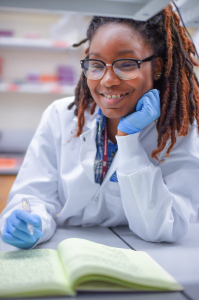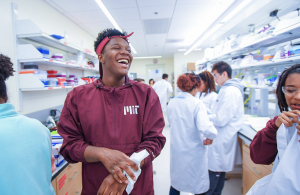Who knew problem sets (or ‘p-sets’) could have such transformative power?
For Detroit natives Zharia Akeem and Dre’Vonne Hilton, six weeks of endless p-sets at MITES in 2019 yielded, naturally, stronger physics and calculus skills, but also new perspectives on college, careers, and the community they want to belong to.

This fall, both Zharia and Dre’Vonne will be moving to Massachusetts to attend Tufts University and Olin School of Engineering, respectively, each supported by full scholarships. While their passion for STEM didn’t start in MITES, the confidence to apply to a variety of schools with the knowledge that they had a real shot at their dream schools, did.
“Without MITES I would have never applied to my top five universities – MIT, Stanford, Olin, Purdue, and Rensselaer Polytechnic Institute,” says Dre’Vonne. Three of these universities offered him admission, and two offered ‘full rides.’ Having applied to a total of around 40 universities, his final decision was based on which university was a better fit for his personality. “I felt like I had a personal bond with Olin… their admissions process was engaging and fun, and very project based, which is how I learn and engage with school.”
After finishing MITES, Zharia felt a boost of confidence that carried her through college applications, AP coursework during her senior year, and even the recent transition to online schoolwork. “I was also able to accept failure much easier because I failed a lot during the summer, and I was taught that it was okay to fail. This experience also showed me that I have what it takes to go to a top institution,” she says. “I find myself reading my MITES evaluations every day for a confidence boost and to motivate me to do my online schoolwork and lectures.”
Zharia was also admitted into the Bridge to Engineering Success at Tufts (BEST) summer program, which allows students to take two courses for credit while participating in workshops that help in the transition from high school to college. “The program is extremely similar to MITES. Even though there are only 10 other people in the BEST program with me, I’m very excited to belong to another community.” For Zharia, the opportunity to have her own special community, and going to school without incurring in debt, ultimately drove her college decision.
Dre’Vonne says his parents were proud and particularly excited about his full scholarship. “That was one of the biggest issues for me going to college. I’m the first one in my family who’s going to a college with a scholarship and out of state,” says Dre’Vonne. “It was good to have a lot of options for college, and being able to go somewhere without being in debt.”
An expanded understanding of STEM
Even though Zharia and Dre’Vonne attend a top public high school in Detroit, the options to explore areas of science, engineering or technology were limited. When OEOP Executive Director Eboney Hearn visited their school to talk about MITES and MOSTEC, their teachers insisted they apply.

“Before MITES I thought you either had to be a mathematician, a physicist or an engineer, and I literally thought one engineer did everything,” says Dre’Vonne. “It was a huge turn to see all the different types of research.” When he joined MITES, Dre’Vonne was curious about cognitive science. Now he is deciding between a software engineering our mechanical engineering major. “I’m thinking of software engineering because with artificial intelligence I can still learn about cognitive science.”
Zharia first learned about engineering from her dad and older brothers. She often saw them doing exciting things in their job, and was curious about the field. “I wanted to find my own path, but I saw them every day doing exciting things, so I was kind of curious, but didn’t want to be labeled as a follower,” she remembers.
“When I came to MITES and learned about all these different types of careers, and all these different colleges that I’d never heard of, I thought that was amazing,” she says. After taking the Genomics course in MITES, she decided to double major in Computer Science with a concentration in Bioinformatics and Biology. “There’s so many things to do in science, I can pick something that is specific to me, and I found I’m comfortable doing engineering as an African American woman.” Zharia’s future goal is to work at the Broad Institute, where her Genomics course was taught.
A new view on opportunity; giving back to Detroit
Reflecting on their experience at MITES, both Zharia and Dre’Vonne highlight the need to offer more opportunities to underserved students.
Both agree the opportunity to leave their hometown, meet a diverse community, and experience a new environment can have a transformative effect beyond individual benefits. “Too much potential goes wasted, and having the opportunity to expand that potential is what’s needed in Detroit, because without that no one is going anywhere, everyone is going to fall into the streets,” says Dre’Vonne.
“I know the people at my school didn’t have the same opportunity to learn about all that’s going on just at MIT alone: all the innovations, inventions and discoveries,” says Zharia. “I feel obligated to take everything from MITES with me, back to Detroit and back to my school.”